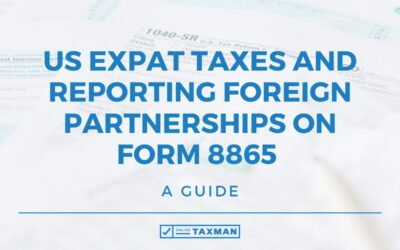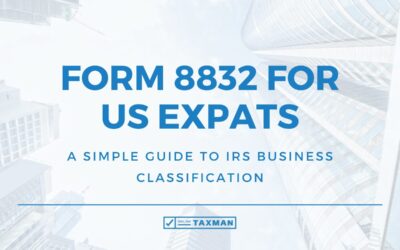For American digital nomads, international freedom doesn’t mean escaping IRS filing responsibilities. No matter where you roam, you must still file US taxes every year, reporting your worldwide income. That’s because US tax law is based on citizenship, rather than just residency. Even if you haven’t set foot on US soil all year, you’re still required to file a federal tax return and possibly pay US taxes.
But that doesn’t mean you’ll be subject to double taxation. With the right strategies and planning, combined with business structuring, you can minimize or sometimes completely eliminate your US tax liability. This guide walks through all the major tax rules American digital nomads need to know in 2025, with real-world examples, current thresholds, and advice that goes beyond the basics.
Do US digital nomads still owe taxes?
Yes, almost always. US citizens and green card holders must report and potentially pay US taxes on their global income, even if they live abroad for decades. The obligation doesn’t disappear because you reside in another country or earn money outside the US.
The filing requirement kicks in once you pass the standard income thresholds for your filing status. For the 2024 tax year, that’s $14,600 for single filers and $29,200 for joint filers under age 65. These thresholds include all types of income – employment, freelance, business, rental, dividends, crypto, and more. For self-employment income, the threshold is just $400 per year.
Even if you don’t owe taxes after exclusions or credits, you still need to file if your income exceeds the threshold. Failing to file can trigger penalties, interest, and, eventually, enforcement actions.
Many digital nomads assume that because they don’t live in the US or earn US-sourced income, the IRS doesn’t apply. That’s a costly mistake. If you’re a US citizen abroad, the default assumption is: yes, you have to file, unless your total income falls under the filing threshold, which is rare for full-time working adults.
Qualifying types of income for expats
Understanding what income is reportable and how it’s treated is crucial. The IRS wants to know about all your income, no matter where it comes from or in what form.
Earned income includes wages, salaries, freelance fees, consulting revenue, and business profits. This is the only type of income eligible for the Foreign Earned Income Exclusion, and even then, only under specific conditions.
Unearned income, such as dividends, interest, rental profits, capital gains, pensions, and royalties, is not eligible for the FEIE. However, you may use the Foreign Tax Credit to offset US tax if you’ve paid tax on this income in another country.
Digital nomads often generate income from multiple sources:
- A remote W-2 job with a US company
- 1099 freelance contracts from US or international clients
- Online courses, ebooks, or royalties from intellectual property
- Crypto trading or staking income
- Investment portfolios, including foreign accounts
Even income from side hustles like affiliate marketing or Airbnb hosting must be reported.
If you’re self-employed, you’re responsible for both income tax and self-employment tax unless covered by a totalization agreement with your host country. Passive income such as rental or investment income remains taxable even when you qualify for exclusions on your earned income.
The Foreign Earned Income Exclusion
The Foreign Earned Income Exclusion (FEIE) is one of the most powerful tools available to American digital nomads. For tax year 2024, it allows you to exclude up to $126,500 ($130,000 for 2025) of foreign-earned income from your US taxable income.
To qualify, your income must be earned, meaning it comes from active work, not investments or royalties, and you must pass one of two residency tests:
1. Physical Presence Test
You must be physically outside the US for 330 full days in any 12-month period. The days don’t need to be consecutive, but partial days don’t count. Travel days and time spent in US territories count as US presence. Keep meticulous travel records to prove eligibility.
2. Bona Fide Residence Test
This test is based on where you live, not just where you travel. You must have a permanent residence in a foreign country and stay there for at least one full tax year. This usually requires a residence permit, tax ID, or other long-term legal ties, so won’t apply to too many nomads.
The FEIE is claimed using Form 2555, which also includes the Foreign Housing Exclusion. This allows additional deductions for qualified housing costs, such as rent and utilities, over a base amount (around $17,290 in most locations). Some cities have higher caps.
The FEIE is not automatic. You must elect it and qualify each year, and it doesn’t exempt you from self-employment tax or FBAR reporting requirements.
The Foreign Tax Credit
The Foreign Tax Credit (FTC) offers a dollar-for-dollar credit against your US tax liability for foreign income taxes you’ve paid. It’s especially valuable if you live in a high-tax country or have income types that don’t qualify for the FEIE. While many nomads don’t settle in one country, the foreign tax credit is useful for those who do or who may have non-earned income (such as rental income) in another country.
To claim it, file Form 1116 with your US tax return. The credit only applies to foreign income taxes, not social security taxes, VAT, or property taxes.
Let’s say you live in (or have income in) a country with a flat 35% income tax on your $100,000 salary, so you pay $35,000 in foreign tax. If your US tax on the same income would be $28,000, the FTC eliminates your US liability. You can’t get a refund from the IRS for overpaying abroad, but you may carry forward unused credits to future years.
The FTC can’t be used on the same income you exclude under the FEIE. However, many digital nomads use a hybrid approach, excluding some income using FEIE, and claiming the FTC on the rest.
Self-employment taxes and Totalization Agreements
Digital nomads who are self-employed must pay US self-employment tax on their net earnings. This includes Social Security and Medicare taxes, totaling 15.3%, in addition to income tax. Unfortunately, the FEIE does not reduce self-employment tax.
However, if you live in a country with a totalization agreement with the US, you may avoid this double tax. These agreements coordinate social security systems between countries and determine where you pay contributions. If you’re contributing to a foreign system, like the UK’s National Insurance or Germany’s pension system, you might be exempt from US self-employment tax.
To claim the exemption, you’ll usually need a Certificate of Coverage from the foreign government. The US currently has agreements with 30+ countries, including Australia, Canada, France, Germany, and Japan. Many popular nomad spots, like Thailand, Mexico, and most of Central America, do not have such agreements.
If you live in a country without a totalization agreement, you may end up paying both US self-employment tax and local social taxes, depending on your legal status and how your income is sourced.
This is one reason some nomads opt to restructure their business as an S corporation, which can reduce the self-employment tax burden by separating salary (subject to social security and medicare taxes) from dividends (not subject). Others choose to set up a foreign corporation, though this has its own compliance burdens.
Choosing the right structure early on can save thousands in taxes and headaches. Mistakes in this area are expensive to fix later.
Choosing a business entity as an American digital nomad
Your business structure plays a major role in how much tax you pay, and how complex your filings become.
Most digital nomads start as sole proprietors, which is simple but tax-inefficient. You’ll pay full self-employment tax on all profits and miss out on some planning opportunities.
Setting up a US LLC is the next step for many. An LLC taxed as a sole proprietorship has the same tax treatment but offers legal protection. If your income is steady and over around $50-60,000 annually, electing S corporation status can reduce self-employment tax significantly. You pay yourself a “reasonable salary” (subject to Social Security and Medicare), and take the rest as distributions (not subject to Social Security and Medicare). This setup requires proper payroll and accounting but often results in major tax savings. Our sister firm Entity Inc can help you with this, and our team also handles S corp election, payroll setup and even bookkeeping
Some nomads set up foreign corporations, either to comply with local law or for tax planning, but this triggers US compliance. If you own 10% or more of a foreign corporation, you must file Form 5471, which is one of the IRS’s most complex and punitive forms. In some cases, you may also be subject to the GILTI tax on profits you don’t even receive.
Moreover, using a foreign corporation can block your ability to claim the FEIE or housing exclusion, depending on how your compensation is structured.
Generally, the safest play is to:
- Use a US LLC or S corp
- Consider a foreign entity
- Always seek professional advice before choosing a structure
Business structure affects how you’re taxed, which forms you file, and whether you can legally optimize your income abroad.
State taxes and breaking residency for expats
Even if you leave the US, your state of residency may still consider you a taxpayer, unless you formally sever ties.
Some states are notorious for trying to tax former residents who move abroad. California, New York, and Virginia lead this list. They’ll often argue you haven’t changed your domicile unless you take very specific steps.
To fully break state residency, you must:
- Give up your driver’s license and register in a new state (or abroad)
- Change your voter registration
- Close state-based bank accounts
- Sell or rent out your property
- Avoid using a friend’s or family member’s address in that state
If you don’t, you might still owe state income taxes on your global income, even if you qualify for FEIE or FTC federally.
If you’re planning to leave the US for the long term, consider changing your residency to a tax-free state like:
- Texas
- Florida
- Nevada
- Wyoming
- Washington
- South Dakota (minimal residency requirements)
This can save you thousands in state taxes each year and make your global tax planning simpler.
Some nomads use these states as a “launchpad,” moving there briefly before heading abroad. You must still show a clean break from any previous high-tax state, including lease termination, removal of mailing addresses, and an intent to remain abroad permanently or indefinitely.
Failing to do this cleanly can lead to audits, penalties, or state tax bills years down the line. Note that if you still spend days working in a state in a year, or receive income from it, again, state taxation may apply.
FBAR and FATCA reporting requirements
Even if you owe no US income tax, you may still need to file international financial disclosure forms. Two of the most important are FBAR and FATCA.
The FBAR (Foreign Bank Account Report), officially known as FinCEN Form 114, is required if your total foreign account balances exceed $10,000 at any time during the year. This includes checking accounts, savings, investment accounts, and even PayPal or Wise if registered outside the US
The FBAR is filed separately from your tax return, directly with the Financial Crimes Enforcement Network. There’s no tax due, but failing to file can result in severe civil and even criminal penalties of up to $10,000 per account, per year.
FATCA, enforced via Form 8938, applies to higher-value foreign assets. If you live abroad and your total foreign holdings exceed $200,000 (single) or $400,000 (married filing jointly), you may have to report them on your tax return. These thresholds include foreign pensions, partnerships, trusts, and investment accounts.
FATCA also requires foreign financial institutions to report US account holders. This has led many banks abroad to deny service to Americans altogether.
These forms are not optional. Many digital nomads overlook them because they don’t generate taxable income, but Uncle Sam doesn’t care. The penalties are harsh and enforcement is increasing.
If you’re unsure whether your holdings require disclosure, it’s always safer to file. These forms are among the IRS’s top enforcement priorities for expats and digital entrepreneurs.
Tax deadlines and extensions for Americans abroad
The US tax calendar looks a bit different when you’re living overseas.
While tax payments are still due by April 15, Americans abroad receive an automatic two-month filing extension, moving the deadline to June 15. No special form is required for this extension, but interest still accrues on any tax not paid by April 15, and late payment penalties from June 15..
If you need more time to prepare your return, you can file Form 4868 for an automatic extension to October 15. In special circumstances, such as military service or natural disasters, the IRS may grant further time.
There’s also a December 15 extension available, but you must request it in writing, and approval is not guaranteed.
If you qualify for the FEIE, be careful. The IRS is strict about late elections: you must file Form 2555 on time, or you could lose the exclusion for that year. Filing late without the proper extension may mean losing out on tens of thousands of dollars in tax savings.
Tax software often defaults to US-based deadlines, so always double-check due dates and extension rules. Missing a foreign deadline could cost far more than missing a domestic one.
Digital nomads often file more complex reporting and filing to do than Americans in the States. Here are the essential forms you might need:
- Form 1040 – The main US income tax return.
- Form 2555 – To claim the Foreign Earned Income Exclusion.
- Form 1116 – To claim the Foreign Tax Credit.
- Schedule C – For reporting self-employment or freelance income.
- Schedule SE – For calculating self-employment tax.
- Form 114 (FBAR) – To report foreign bank accounts.
- Form 8938 (FATCA) – To report foreign financial assets.
- Form 5471 – For owners of foreign corporations.
- Form 4868 – To request an extension to file.
- Form 8621 – If they invest in foreign mutual funds or ETFs.
Each form plays a role in reducing your tax burden or staying compliant. Filing the wrong combination (or missing one altogether) can trigger IRS scrutiny or block you from claiming exclusions and credits.
Most nomads benefit from tax software built for expats or working with a CPA who specializes in international returns.
Catching up: Streamlined filing for expats
If you’ve lived abroad for a while and didn’t realize you had to file US taxes, you’re not alone. Many digital nomads fall behind simply because they didn’t know the rules. Fortunately, the IRS offers a way to catch up without penalties through its Streamlined Foreign Offshore Procedures.
To qualify, you must:
- Be living outside the US for at least 330 days in one of the last three years.
- Have failed to file due to non-willful reasons (i.e., ignorance, not fraud).
- Submit the last three years of tax returns and six years of FBARs (if appropriate).
- Include a signed non-willful certification explaining your situation on Form 14653.
If accepted, the IRS waives late filing and FBAR penalties. You can still claim the FEIE, FTC, and other deductions retroactively, often reducing or eliminating your tax due.
This program is one of the most forgiving options available to expats, but it’s not guaranteed to last forever. The IRS can end or revise it at any time. If you’re behind, don’t delay.
Getting caught up now protects you from future penalties, and it lets you take full advantage of tax-saving opportunities going forward.
Digital nomad visas and tax perks
A growing number of countries are offering digital nomad visas, residency programs designed for remote workers who earn income outside the host country. These visas often allow you to stay for 6 to 24 months and may include tax advantages.
Here are three examples:
- Portugal offers a D8 digital nomad visa and a D7 passive income visa. For many US citizens, this means no Portuguese tax on foreign freelance or employment income.
- Barbados has the Welcome Stamp, a one-year visa for remote workers. The country doesn’t tax foreign-sourced income, so you may avoid local taxes entirely (though you’ll still need to file with the IRS).
- United Arab Emirates (UAE) offers a one-year remote work visa and has no personal income tax. This makes it a favorite among crypto traders and high earners, but remember: no tax treaty means no relief on US self-employment tax.
These visas can also help digital nomads qualify for the bona fide residence test for the FEIE, as long as legal ties and housing are established. However, you must be cautious, as some countries consider digital nomads tax residents if you overstay a visa or earn local income.
Always research the tax laws of the visa country before applying. Not every nomad visa includes automatic tax breaks.
Foreign tax residency and local taxes
While the US taxes its citizens no matter where they live, many foreign countries also tax based on residency. If you spend enough time in one place, or meet other residency criteria, you may become subject to local income tax in addition to US tax.
Here’s how it works in three popular nomad destinations:
- Spain considers you a tax resident if you spend more than 183 days in a calendar year or if your “center of economic interests” is there. Residents are taxed on worldwide income, with rates up to 47%. Spain also requires comprehensive reporting of foreign assets (Modelo 720), and penalties for failing to comply are severe.
- Mexico defines tax residency more broadly. You may become a resident if your main home is in Mexico or if over 50% of your income comes from Mexican sources. Residency often applies even if you’re on a tourist visa and renting short-term housing.
- Thailand traditionally taxed only foreign income remitted into the country. But since 2024, new regulations allow the government to tax global income of residents, even if not brought in. The rules are evolving, so caution is key.
Becoming a tax resident abroad doesn’t exempt you from US tax, but it may entitle you to use the Foreign Tax Credit. If your local tax rate is higher than the US rate, you may owe zero to the IRS.
However, without proper planning, you could face dual taxation. That’s why tracking travel days and maintaining documentation is essential.
Digital nomad tax strategy examples
Digital nomads use a range of tax strategies depending on their income type, location, and business structure. Here are four real-world examples that demonstrate different approaches:
1. Remote Employee Living in Portugal
Rachel, a US citizen, works remotely for a US startup and earns $120,000 annually. She doesn’t live in any one country, but keeps traveling from country to country, so avoids becoming a tax resident anywhere. She spends over 330 days outside the US, so she qualifies for the Foreign Earned Income Exclusion using the physical presence test. Rachel files Form 2555 to exclude her income. Her total US tax due: $0.
2. Self-Employed Consultant in Thailand
James earns $100,000 from international clients as a marketing consultant. He uses the FEIE to exclude $130,000 and pays Thai tax only on what he remits. However, because Thailand lacks a totalization agreement, James still owes 15.3% US self-employment tax. He forms a US S corp, pays himself a $50,000 salary, and reduces his SE tax to ~$7,650.
3. Crypto Trader in UAE
Leila trades full-time on crypto markets while living in Dubai. There’s no income tax in the UAE, but she must report all trades to the IRS. She files a 1040, Schedule D for capital gains, and an FBAR for her Dubai bank account. She pays US tax on capital gains but nothing to the UAE.
4. Online Business Owner in Mexico
Alex operates a successful SaaS platform. He becomes a Mexican tax resident and pays 30% local tax on global income. Using Form 1116, he claims the Foreign Tax Credit, which cancels out his US tax. However, he has structured his business as an offshore LLC, which he must report using Form 5471, one of the most complex IRS forms.
Filing as an American digital nomad can be complicated
American digital nomads face a tax system that follows them around the globe. But with the right strategies and advice, you can minimize what you owe, stay compliant, and avoid painful surprises.
Use tools like the FEIE, FTC, and totalization agreements. Pick the right business structure, stay current on deadlines and forms, and don’t ignore foreign tax residency rules.








